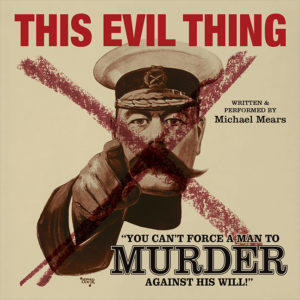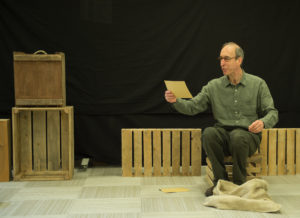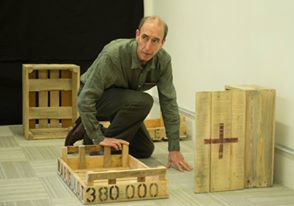
 (4 / 5)
(4 / 5)
This didactic play tackles the controversial subject of conscientious objectors during World War One.
Conscientious objectors, or CO’s as the play’s devisor Michael Mears refer to them are those people who for various reasons refuse to fight or even engage in any activity that contributes to the promotion of warfare. These reasons may be religious, political or idealistic or a combination of more than one of these factors.
The most prominent character portrayed in the play is a man named Bert Brocklesby who was born and brought up near Doncaster as a Methodist but who had also interests in the Quaker and Baptist church movements. In fact, he eventually became a Quaker who are the religious group mostly closely associated with Conscientious objecting.
It is not the first recent play that focusses upon the CO’s during WW1. Both of these play examine CO’s within a regional basis, in contrast to “This Evil Thing” that examines a national set of affairs. In “Devils on Horseback”, a 2017 production by Goldsmith College, the trials of CO’s in Deptford are shown, based upon research of historians at the College. “England Arise” by Bent Architect portrays the activities of CO’s in Huddersfield. In fact, Yorkshire was a hotbed of co activity during WW1. This play has been criticised as feeling a little overlong, albeit the running time at 75 minutes is the same as the play under review here.
Positioning myself at the end of a crescent shaped set of rows at the Sherman Studio Theatre, I was easily able to notice my fellow audience member’s level of attention, for a play that demands it, and I am impressed by how riveted they were, which is testament to the engaging nature of this play. Mr Mears, at the end of the performance complimented the audience on their level of attention.
Michael Mears is a well-known and award-winning figure on the Fringe Theatre circuit for largely his one-man plays which he both writes and acts in. “Soup” another one-man play has won the Scotsman Fringe Award” which examines homelessness.
“This Evil Thing” was first performed at the Edinburgh Festival in 2016, and was well received.
“A thorough and at times gripping account of an important subject.”
4 out of 5 stars – The Scotsman
“Mears is an animated and engaging presence throughout, his faithful delivery of others’ words accommodating many a naturalistic flourish. Entertaining as his show may be, his gratitude and outrage remain very much to the fore. This is important, vital polemic.”
4 Stars out of 4 Fest (Edinburgh Festival magazine)
In an interview for the Stratford-upon Avon Herald in January this year, Mr. Meyers was asked the question how he would describe this play.
He replied, “It’s the compelling and rather shocking, and also inspiring, story of the First World War conscientious objectors (CO’s) in Britain, which has rarely been told or even talked about. In this period of commemoration of the war there’s a lot of focus on the battles, but I knew there would be plenty of material on that and wanted to write about something else. My grandfather fought in the First World War and my father in the Second but I don’t seemed to have inherited the genes, I’m a pacifist — so it seemed appropriate to focus on that. The full interview can be found here.
I would entirely agree with this.

Image Simon Richardson
The design of the production is sparse in the extreme. Nine wooden boxes of different sizes, a wooden post and a bag amount to the set’s design. This minimalist approach works well, as due to the play’s physical nature, it allows Mr. Meyers to energetically move around the set. The boxes are used very creatively. For instance, they transform into a lectern, stretcher, bed, window, bench, representations of human figures in a military tribunal, coffin and even simulating gunfire by their sudden collapsing.

Image Simon Richardson
The play opens with a very effective use of lighting depicting a CO who was being punished by having to stand upon a box for hours upon end in a pit which has water lying at the bottom. The box protecting the prisoner from having to stand in the water. The only lighting on a totally dark stage coming from directly above. The play ends with the same scene. This very symbolic use of darkness and light can be interpreted in different ways which are not difficult to work out.
Over the course of the play’s seventy-five minutes, Mr. Meyers plays over fifty characters. An impressive feat, and I wonder whether the performer ever lapses into using the wrong voice, e.g, whilst playing a sergeant-major he slips into using a plummy public accent typical of a British army officer. His use of so many diverse voices and accents is one of the highlights of the play, as this compilation of scenes taken from the play illustrates.
The sentiment of the play is totally one-sided. Mr. Meyers is a committed pacifist and in a way, the play suffers from this one-dimensional view.
This is clearly depicted in the promotional flyer and poster.

The eponymous poster of Lord Kitchener pointing his figure towards all men able to fight, “Britons Wants You”, is mutilated by the red-cross, (symbolising blood), which intersect over the mouth, thereby gagging the message.
In a post-performance forum, I asked whether Mr. Meyers accepted that being a CO was essentially a selfish act. Naturally, he disagreed and the discussion was somewhat diverted into a matter of courage rather than the question I posed. My reason for implying this statement is that the CO’s were buoyed by their own strength of conviction, whereas his family were usually ostracised for his refusal to fight, with an inevitable implication of cowardice being the motivating factor. Contrast this to Junior Officers who suffered the highest casualty levels in WW1 over the men they led and their senior officers who were often protected well being the Front Line. Posing the question why these officers were prepared to die with almost an submissive inevitably, I suggested that largely it was due to protecting the family honour, thereby sacrificing themselves to protect the humiliation of cowardice from their loved ones.
Also, a scene where Bert Brocklesby refuses to peel potatoes because he was helping to prepare a meal for officers and men, on the basis that he would not help in any way the progress of war, I found to be trivial. However, I would concede that Mr Mears is only portraying the facts of a real life character, and others such as the eminent philosopher and later CND co-founder Bertrand Russell and Prime Minister H. H. Asquith also feature.
Mr. Mears is an engaging figure, both on and off stage. He is clearly fired up by the message he is bringing and totally committed to it. An interesting character in his own right, he is an active long-distance walker, which would aid his fitness level essential to his own brand of physical theatre.
This message is a worthy one. As to its relevance today is another matter. I cannot foresee, due to the technical advance of weaponry, a situation where conscription will ever be re-introduced. In today’s world, blessed by 75 years of involvement in international conflict on a national level, our attitudes towards CO’s has softened. The play reminds us that these men possessed a different type of bravery in swimming against the tide, and should be remembered with compassion and understanding for doing that.
On the performance I attended, the 100 seater theatre was just over half full. This is a sad reflection on the demands of theatregoers today. Many, it seems, see the role of theatre to be solely based upon entertainment factors, thereby omitting an essential aspect of theatre which should be to educate. The concentration ability in today’s world would appear to have been irreversibly damaged through instant revelation provided through technology. I compare it to 20-20 cricket as compared to a test match. Although, I will happily concede that there is a place for both, I fear that the relentless march of entertainment musicals, (whilst acknowledging their financial input often sponsors drama), may mean such important plays such as “This Evil Thing” will become a rarity.
Sherman Theatre is the opening venue of a two month tour which returns to Wales on :-
11th November 2017 Galeri Theatre, Caernarfon
24th November 2017 Aberystwyth Arts Centre
Full dates can be found here
“This Evil Thing” performed and revised by Michael Mears.
Directed by Rosamunde Hutt
Performed at Sherman Studio Theatre Cardiff 25th and 26th September 2017
